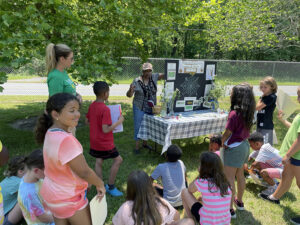
BERLIN – Grants from the Maryland Coastal Bays Program are expected to help a variety of local organizations accomplish environmental projects.
The Maryland Coastal Bays Program (MCBP) in May announced winners of its mini grant program. The funding is meant to support education, outreach, resiliency and research in the area.
“The goal of the mini grant program is to invest in the health and resiliency of our local community by giving diverse organizations access to funding for projects that will enhance communities and, overall, improve natural resources,” said Chandler Joiner, MCBP’s education program manager.
Grant recipients include Spencer Rowe Environmental Consultants, in partnership with Assateague Coastal Trust (ACT), who received $4,999 to support the installation and monitoring of five water level loggers through the coastal bays and tributaries.
“These devices will be used to track tidal fluctuation and will help in determining mean low water more accurately,” a MCBP Facebook post reads. “Such data will be vital for shoreline restoration as well as shoreline construction and stabilization projects.”
Also receiving a grant was Go Green OC, where the $4,996 in funding will be used to purchase equipment to support the expansion of the Ocean City composting program. Assateague Coastal Trust received $4,911 to fund eight scholarships to ACT’s summer camp. The camp, Coast Kids Nature Explorers and Wild Scientists, is a summer enrichment program that gives kids the chance to explore the watershed and study backyard life. The grant funds allow the program to offer scholarships to students from low-income families who receive free and reduced meals in school.
Another grant recipient was the Freetown Education, Research, and Cultural Center. The center was awarded $4,977 to restore the historic Coolspring African American cemetery and preserve the surrounding wooded area.
“African American cemeteries document the profound history dealing with slavery, spiritual practice, periods of war, and societal issues,” a social media post from MCBP reads. “These sacred sites honor the lives of those who paved the way for their descendants to have a better life. Unfortunately, African American cemeteries are critically in need of repair. This holds true for the historic Coolspring Cemetery. The Cemetery is located in a dense wooded area and the Freetown Center will be using the grant funds to ensure restoration is done properly and with consideration of the important surrounding natural resources.”
In addition, the Germantown School Community Heritage Center was awarded $4,981 to assist with a butterfly garden and a native plant medicinal garden. Volunteer Karen Prengaman said the grant will help give visitors a glimpse into the natural life of early 20th century students.
“The grant will fund two stations in the center’s upcoming walking tour, a healing garden and a migrations garden,” she said. “These gardens include the plants that sustained the communities of the Eastern Shore at a time when outside food was scarce and doctors were even scarcer. In addition to the gardens marked with signage, a foraging experience will take visitors on their own plant hunt. In the fall, the gardens will recreate the butterfly migrations that live on in the memories of local students. Visitors will take their experience home with a coloring book filled with the plants and student memories.”
Prengaman said the butterfly garden was being established because the arrival of the fall butterflies was a vivid memory of those who’d attended the Germantown School as children.
“Each fall butterflies filled their community, and, while the migratory encounters have diminished over time, they live on in the memories of the students,” she said. “Through the garden, the fall migrations will return for future generations to experience once again.”

